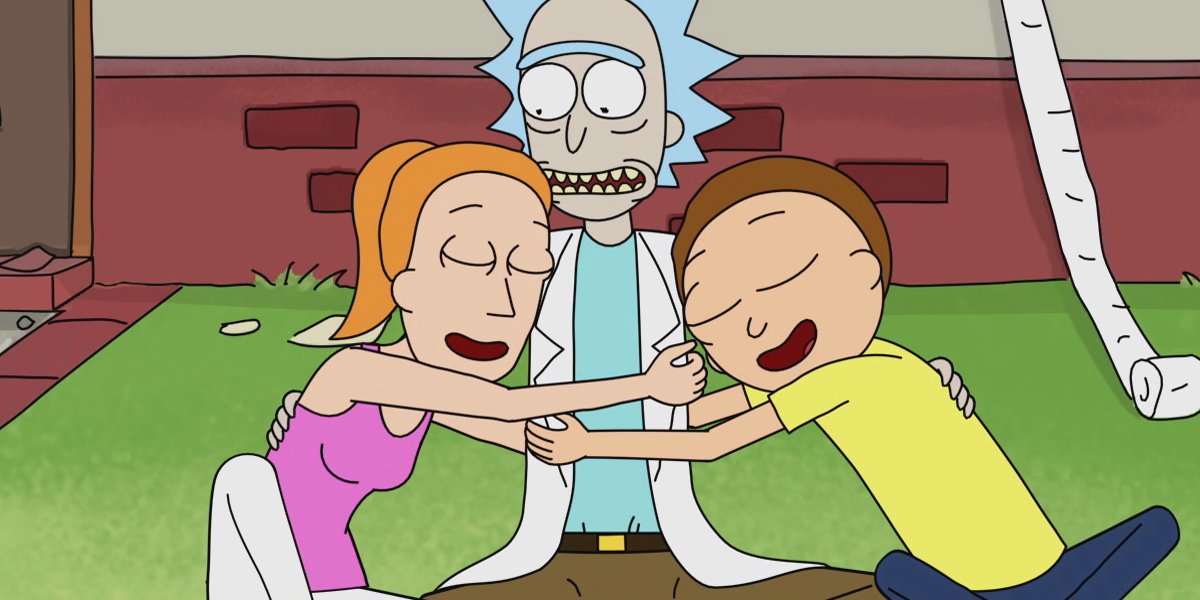Why Dan Harmon And Justin Roiland Choose To Keep Away From Rick And Morty Fan Theories

Your Daily Blend of Entertainment News
You are now subscribed
Your newsletter sign-up was successful
While there are plenty of television shows out there that struggle to find an audience, Dan Harmon and Justin Roiland’s Rick And Morty operates with one of the most engaged fanbases around. Not only do people clearly love the show (and showcase that love online frequently), but they also dig deep into it and formulate all kinds of strange theories about both past episodes and where things are going in the future. It’s a fun group to be a part of if you really love the Adult Swim series – but if you’re hoping that the show’s creators are constantly digging through the material and reading fan pieces, we have some disappointing news: they’re not. On the plus side, however, they have some very good reasons.
With Rick and Morty Season 4 having just ended, I recently thought to look back at a two-on-one interview I did with Dan Harmon and Justin Roiland prior to the main run of Season 3 episodes, and one of the interesting subjects covered in conversation was about their relationship with fans and their engagement with fan engagement. I asked the duo about their awareness of chatter and audience theorizing, and they explained why it is that they’ve learned to keep away. Said Roiland,
We don't read that stuff now. It's fun to talk about all these different possibilities, but there's only a few things, a very, very small number of things that we would be interested in canonizing from this realm of fan theory stuff. I think it's more fun for us to just keep charging ahead. And then only when we hit a wall where we're like, 'Shit, okay, we have to make a decision about this in order to tell this type of story or this specific story,' do we go back and start looking through all of the evidence. But we definitely stay away.
Continuing, and being as respectful to the Rick and Morty fans as possible, Justin Roiland explained that part of the detachment from fan theories and chatter comes simply from his closeness to the material. In the same way that a farmer may not want to peruse a bunch of corn recipes after spending an entire day harvesting, the show co-creator doesn’t ever find himself feeling super excited to read message boards and social media after having spent his days burning out his brain coming up with material in the writer’s room and recording booth. He explained,
For me it's more just like I don't want it in my head, you know? And also, maybe this is horrible to admit, but I think it's also when you're working on the show and you're in the writer's room for X amount of hours a day and your brain is melting from all the potential permutations of all these stories we're trying to break, the last thing you want to do is go home and lay in bed and then read more things that you've been thinking about from other people outside of the room.
For Dan Harmon, the case of Rick and Morty is an interesting one, as he has a bit of experience when it comes to actively discussing his work with a show’s fanbase. When his first network series, Community, was airing on NBC, Harmon was regularly interacting with audiences and even incorporated certain encounters into various episodes (a prime example being Chevy Chase's Pierce’s use of the fake expression “Streets ahead” in Season 1, which originated from a fan mocking Harmon online using the non-existent phrase).
As Harmon explained, part of the reason he felt compelled to be a part of that conversation was because he felt that being a part of it helped him psychologically deal with the fact that it existed and wasn’t something within his control:
What I found on Community, it's unavoidable that when people are handling the thing that you work on and care about, they're going to use language that might affect you emotionally. And it's a mistake to chime into that conversation. And I think it's also a mistake to even be reading it because chiming in is a way of coping with it.That's what I would do with Community, and be like, 'What are the fans saying? Oh, that fan is saying something that makes me sad. So instead of walking around sad, I'm going to finish being sad by logging into Reddit and saying, 'Hi, Dan Harmon here. This makes me sad,' And then I'll be done with it.' Well, yes, you'll also be in TMZ. I don't want to walk around with the sadness.
To further express his view on the subject, Dan Harmon used what is a frequent metaphor among Hollywood writers by comparing his work to a flesh-and-blood baby that a parent raises and puts out into the world. As a good parent, he wants to be sure that his child is being treated well and respectfully – but the nature of the world is that it’s never going to provide the exact treatment you expect, and it’s a hard thing to see something innocent exposed to cruel nature. Said Harmon,
It's an overused metaphor, but it's the one that works. It's like your baby. You make something and it's like a baby. And so going into a place like Reddit, it's like watching your baby just get thrown around by people love it. It's amazing. And then stopping to say like, 'Oh, I don't like these seams; there's gunk on it.' And then throwing it. And you're like, 'First of all, that was verbally hurtful. Second of all, you're throwing my baby,' and it's landing everywhere and it can't get hurt. That's where the metaphor breaks down. But it does affect you the same way.
It’s a reasonable perspective. No piece of art is ever going to be universally beloved, and while Dan Harmon and Justin Roiland have a great deal of pride in what they’ve created for Rick and Morty, there is a point where it stops belonging to them and starts belongs to the fans, and that’s not always an easy transition. They’ve learned that the smarter move is to simply step away.
Your Daily Blend of Entertainment News
What’s more, they’re not even entirely convinced that Rick and Morty fans actually want to know that they are checking in on fan theories and their analysis of the show. Harmon explained that he feels as though audiences should be able to express their thoughts about and appreciation for the show without the knowledge that the showrunners are looming and judging takes on their creation. Said Harmon
They don't want us there!... Why would you want to think when you were typing about your favorite show that you had to filter it through 'Maybe Vince Gilligan is gonna come in and read it.' You'd rather just talk about Breaking Bad.
As noted earlier, Rick and Morty recently completed its run of Season 4, and now the wait has begun for Season 5. Cable subscribers can watch the most recent episodes for a limited time on the Adult Swim website, or purchase them online and previous seasons are available digitally, on both Blu-ray and DVD, and on HBO Max and Hulu.

Eric Eisenberg is the Assistant Managing Editor at CinemaBlend. After graduating Boston University and earning a bachelor’s degree in journalism, he took a part-time job as a staff writer for CinemaBlend, and after six months was offered the opportunity to move to Los Angeles and take on a newly created West Coast Editor position. Over a decade later, he's continuing to advance his interests and expertise. In addition to conducting filmmaker interviews and contributing to the news and feature content of the site, Eric also oversees the Movie Reviews section, writes the the weekend box office report (published Sundays), and is the site's resident Stephen King expert. He has two King-related columns.

